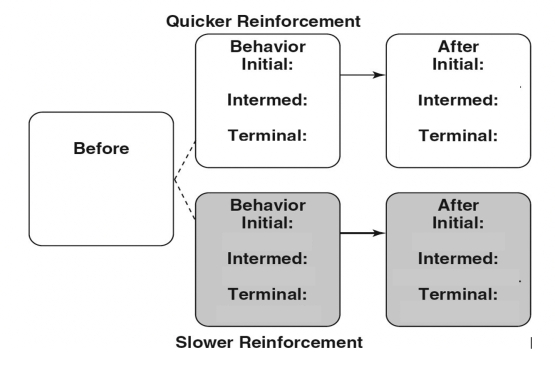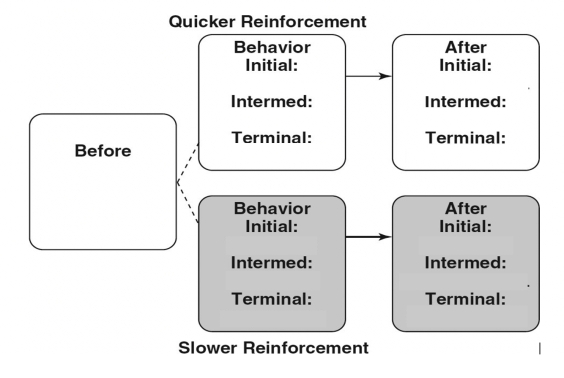Exam 18: Shaping
Match the numbers to the words that goes in each box in comparing variable-outcome shaping and fixed-outcome shaping.
Fixed-outcome shaping Variable-outcome shaping \# of outcome sizes 1 2 Regression to earlier levels 3 4 Usual source of shaping 5 6
-Number 6 is:
A)No reinforcers
B) Weaker reinforcers
C) Performance manager
D) Nature
E) One
F) Many
D
Fill in the Blank
-Fixed-outcome shaping
Shaping that involves no change in the _____________________________of the reinforcer,
as ______________________________ more and more closely resembles
the ______________________________ behavior.
Shaping that involves no change in the magnitude or type of the reinforcer, as the behavior more and more closely resembles the target behavior.
Define the following concepts:
-Shaping with reinforcement
Shaping with reinforcement is a behavioral modification technique used in operant conditioning, a method of learning that employs rewards and punishments for behavior. This concept was developed by B.F. Skinner, a psychologist who is considered one of the fathers of behaviorism.
Shaping involves the reinforcement of successive approximations of a desired behavior. Essentially, it is a step-by-step process that starts with reinforcing any behavior that is even remotely close to the desired behavior. Over time, the criteria for reinforcement become more stringent, and only behaviors that more closely resemble the target behavior are reinforced.
Here's a breakdown of the shaping process:
1. **Identification of Target Behavior**: Before shaping can begin, the specific behavior that is desired must be clearly defined. This target behavior is the end goal of the shaping process.
2. **Establishing a Baseline**: Determine the subject's current behavior to understand the starting point. This baseline behavior is what will be shaped into the desired behavior.
3. **Successive Approximations**: The trainer or experimenter reinforces behaviors that are progressively closer to the target behavior. These are called successive approximations because each one is a step closer to the desired end behavior.
4. **Reinforcement**: Positive reinforcement (such as food, praise, or a toy) is given immediately after the desired behavior is performed. This increases the likelihood that the behavior will be repeated.
5. **Raising the Criteria**: Once the subject consistently performs the reinforced behavior, the criteria are raised, meaning that only better approximations of the target behavior are reinforced. This step is repeated until the target behavior is achieved.
6. **Continuous Reinforcement and Intermittent Reinforcement**: Initially, continuous reinforcement (a reward after every desired action) may be used to establish the behavior. As the behavior becomes more consistent, intermittent reinforcement (rewards given only some of the time) can be used to maintain the behavior.
Shaping with reinforcement is a powerful tool in teaching new behaviors and skills, and it is widely used in various fields, including animal training, education, therapy, and behavior modification programs. It is particularly useful when the desired behavior is complex or entirely new to the individual or animal being trained.
Training Rudolph to increase the force of the lever press involves
Please match the following definitions with the terms below. (Not all of the terms will necessarily be used. In fact, some may be fictitious.)
-Operant level
Match the numbers to the words that goes in each box in comparing variable-outcome shaping and fixed-outcome shaping.
Fixed-outcome shaping Variable-outcome shaping \# of outcome sizes 1 2 Regression to earlier levels 3 4 Usual source of shaping 5 6
-Number 5 is :
A)No reinforcers
B) Weaker reinforcers
C) Performance manager
D) Nature
E) One
F) Many
Fill in the Blank
-Initial behavior
Behavior that ______________________________ the terminal behavior
along some ______________________________ dimension
and occurs at least with a minimal ______________________________.
Show the difference between shaping and behavioral chaining with a human student example.
Fill in the Blank
-Terminal behavior
Behavior not in the ______________________________
or not occurring at the ______________________________ frequency;
the ______________________________ of the intervention.
Please match the following definitions with the terms below. (Not all of the terms will necessarily be used. In fact, some may be fictitious.)
-Shaping with punishment
How would you shape lever presses of 100 grams force using a punishment contingency?
Contrary to popular opinion, it is possible to do shaping with punishment.
Please match the following definitions with the terms below. (Not all of the terms will necessarily be used. In fact, some may be fictitious.)
-Intermediate behaviors
________ shaping is usually planned by a behavior modifier.
Fill in the missing words for
-Variable-Outcome Shaping Along the Topography Dimension

How would you shape lever presses of 100 grams of force using a reinforcement contingency?
How would you shape putting on glasses? Include:
the terminal behavior
the initial behavior
the intermediate behaviors
the response dimensions
the reinforcer
the results
Variable-outcome shaping is a natural process rarely found in the research lab, more often in the everyday lab of Mama Nature.
Give a brief example of each of the following:
-Terminal behavior
Fill in the missing words for
-Variable-Outcome Shaping Along the Force Dimension

Filters
- Essay(0)
- Multiple Choice(0)
- Short Answer(0)
- True False(0)
- Matching(0)